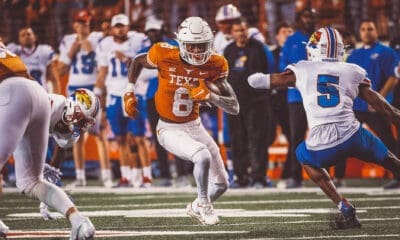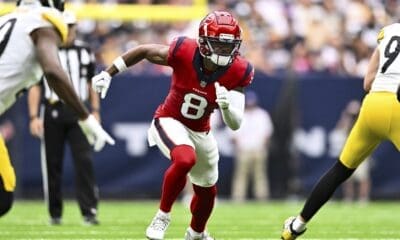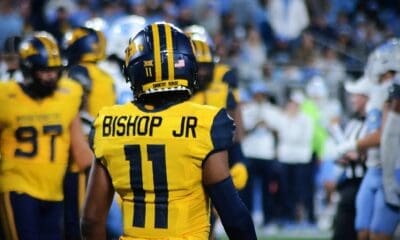Steelers News
Catching Up with former Steelers TE Jay Riemersma

Our Steelers Interviews series continues as Ron Lippock caught up with former Pittsburgh Steelers tight end Jay Riemersma. Riemersma played for the Steelers from 2003-04, finishing his NFL career in the Black and Gold.
First, can you let me know what you’ve been doing with yourself since your time in the NFL?
I’m working for a non-profit: the Family Research Council. It’s based in Washington, D.C. but I work and live in my hometown of Holland, Michigan. I’m the Senior Director of Development, which in the corporate world would mean the manager of sales, but in the non-profit world it means doing the nasty work like fundraising.
How hard was that adjustment to post-NFL life?
It was more challenging than what I anticipated it being. So many of us are so focused on their NFL career – on the things they need to do to improve – that kind of stuff. They don’t think about that next chapter.
When it ends, it’s usually sudden. For me it ended because I had a career-ending injury. I tore my Achilles heel in December and I knew that the length of time for recovery meant I couldn’t come back until the following year. So I had that in mind and started to coach high school football. I got plugged into the athletic director at my alma mater and targeted a 2006 comeback. But when I came back I didn’t have that speed or explosion anymore. Now what?
So, I had the realization that I needed to find something else. I was very blessed to have played as long as I did. But I had to find something else and feed my family.
You also ran for office in Michigan after you retired. What prompted that?
I grew up in a family that had strong Christian foundations. We went to church every Sunday and talked about politics and what we learned at the dinner table. So it wasn’t a huge leap for me.
I started working at the Family Research Council in Holland. My mother worked there. I majored in communication but minored in political science so I always had interest in politics. I met Pete Hoekstra there – he was the House representative. When he ran for Governor, he called me and told me he thought I should consider running for his House seat. I gave it a try. I lost — was shy by just 600 votes. I put in a lot of time and money. It was a bitter defeat but I had a wonderful time meeting people and shaking hands. Afterwards, I went back to the Family Research Council.
I wanted to ask you about signing with the Steelers in free agency. What prompted that move?
Before I signed with Pittsburgh, I knew they had a good, veteran tight end there in Mark Bruener. When Bill Cowher was in his recruiting process, he talked to me about the need to open up the offense. He said they needed a guy who get down the middle of the field and get defenses out of the Cover-2. I excelled doing that. I was good at making those catches in the middle of the field. I wasn’t sure though that that would really happen. But Cowher explained to me how the offense was evolving. And I got excited about that and the tradition of winning.
Kevin Colbert was in Detroit when I was drafted by Buffalo. He had called me and said he wanted to draft me before I went to Buffalo. I was put on the practice squad in Buffalo and he tried to pick me up off of the practice squad. I said no. I grew up in Michigan and saw the team for too long. And I felt comfortable in Buffalo and felt I would get an opportunity there.
Did anyone take you under their wing when you were there?
It’s funny. When I came to Pittsburgh for the dog and pony show when they were recruiting me, they brought me through their facility. Jerome Bettis was on a training table when I walked through – rehabbing from one of his surgeries. I played Pittsburgh that year and had success against them. When he saw me, he said “Jay Remiersma!” — even pronounced my name correctly. He gave me his phone number and told me he was serious, that if I ever needed anything he’d make it happen. That he owned this town!
Now, you all knew Bettis then and that that’s what he was like. But I’ll never forget that. Him standing on front of the cold tubs telling me that. It was a big selling point for me.
Any fun stories of your time there?
I didn’t realize if at the time I was there, but my uncle told me he had some trivia for me. He followed football more than I did I think. He asked me who at the time what the longest letter combination for a Pittsburgh touchdown combo was. He then told me it was Roethlisberger to Remiersma!
You suffered a number of injuries during your career, some that happened just as you seemed to be peaking. How hard was that for you and how did you deal with that?
It was very difficult, to be perfectly honest. I realized that it wasn’t my face as a football player that was so important. As a Christian, I realized what was really important. You may get the highs when you score a touchdown in front of tens of thousands at a key time in a game, but no one is looking at you when you get injured and your not on the field. I realized my value was not what I did on any given Sunday. There were so many more important things.
My first two years playing, I felt after a game on Sunday I could play the next Monday. Years three-to five, it took until Wednesday for me to feel that way. Years six to eight, I think it took until Saturday, And my last couple of years, on Sunday, I didn’t know if I could play that day! My body didn’t respond like it did before. That was frustrating.
I couldn’t train like I used too. When players get older, you see their pad levels start to come down. Their knees don’t bend like they used to. They’re not rolling their hips. It’s not that they don’t want to. It’s just that they can’t. What helped me was that I was a smart player. At Michigan, I was quarterback before I was moved to tight end. I had that knowledge of the game and that helped me.
What do you think about the way the tight end position has evolved since you played?
Holy smokes, the tight end position is now the main focus on some offenses. Back when I played, that was before many of the basketball players were making their move to the NFL. I was a good basketball player in Michigan. I was the runner up for Mr. Basketball. Basketball was my first love. I was going to play at Western Michigan but they wanted me to play basketball and football. So I went to Michigan and my coach told me I had a real chance at playing football because of my frame. I was 6-foot-5, 240 pounds. Those guys were power forwards then, they weren’t playing football. Now you see guys like Antonio Gates who never played football making it in the NFL. Pete Gonzalez too, who I modeled my game, though not very well, after!
What do you think about the way the NFL itself has changed?
The silliness over the hits thing bothers me. I knew every year I was putting my body and my life on the line. But I wouldn’t change any of it. Of course I haven’t lived yet to be 55 years old and have Alzeimers. But I’d play tomorrow if I could.
The softening of the game I think runs the risk of people not liking and following the NFL. It needs to be a violent and respected sport to bring in revenue.
What people don’t talk much about too is that half the time when guys get drilled over the middle, it’s their fault. When they run a man route over the middle through zone coverage, you have to give yourself enough space so you don’t get hit from the blind-side safety. You have to give the quarterback a chance to get the ball to you without running you into the safety. That’s the cerebral nature of the game that some even great athletes don’t do well that gets overlooked.
It’s a disservice to the game in the long-term to soften the game, and people don’t recognize that sometimes.














